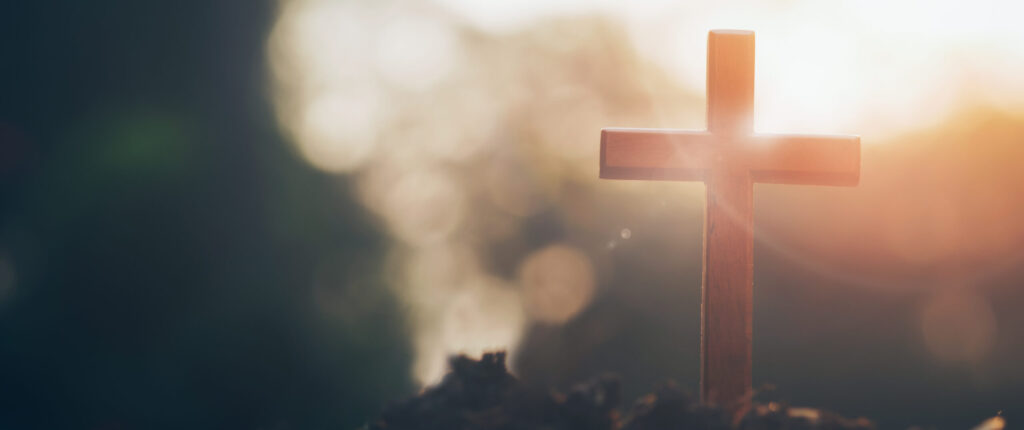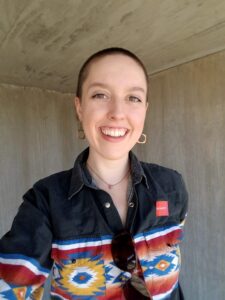An Ignatian Guide to the Spiritual Life
By Z Zinsitz

This post was originally written as a paper for EF 1500: Introduction to Spirituality and Missional Formation taught by Bo Karen Lee and Kelsey Lambright.
I was first introduced to Ignatian spirituality almost a decade ago through a 5-day retreat at the Jesuit Spirituality Center of Grand Coteau in Louisiana. Amid a period of grief and looking for extended silence, I stumbled upon Ignatius of Loyola’s Spiritual Exercises. I found myself transformed by his deceptively simple, but incisive, wisdom. I’ve been going on Ignatian retreats annually ever since. As the years have progressed and my own spiritual life has broadened, I am in awe at the ways in which the structure of specific spiritual practices can provide a lens to reflect on the broader and more chaotic experiences of ordinary life. After all, the work of spiritual formation–nurtured in silence and contemplation–can sometimes feel alienated from the work of missional formation–the attempt to draw our collective world into deeper connection, care, and love for self and Creator. However, over time and much reflection, I am beginning to see spiritual and missional formation as interlocking, feeding one another as each produces byproducts that must be processed by the other.
Ignatian Spiritual Exercises, which walk the road of the Paschal Mystery, have come to provide a clear framework for my own life. The experience is cyclical. Spiritual formation leads me outward to mission, which in turn creates wounds and spaces of longing that draw me back to the well of God’s love. Journeying through the “Four Weeks” over and over, I find that I have been drawn deeper inward to spiritual growth and outward to justice, witness, and solidarity with the world. However, I also think that the gifts of each week can be overindulged or simply grasped too tightly; often when I am in a space of spiritual stagnancy it is because I am not allowing myself to transition into the next stage. Thus, each week has its spiritual or missional character, its gifts, and its risks.
Ignatius’ first week has been a space to rediscover God’s love and acknowledge my own deep brokenness. The first week falls squarely in the spiritual formation camp—it is inwardly focused, unabashedly personal. I often I stumble into the first week, initially unaware that I have lost sight of God’s love for me. I find myself praying, but feeling frustration or distance, yearning to distract myself from what feels like “pointless, boring downtime.” However, once God’s love is revealed, either through an intentional prayer practice or sometimes through the grace of confrontation during my self-distraction, I always fall to pieces. There is something about recognizing God’s love, about receiving it in deep measure after a drought, that leads me to feel at once grateful and guilty. Grateful, because I see how deeply I need it, and guilty for my forgetfulness and for the things I have done to myself or others because I was certain that I was on my own. This guilt takes time to untangle. It takes the patient presence of God’s love, accessed through practices of prayer and reflection, and sometimes confession or acts of contrition. This ‘week’ is a necessary precondition for mission because I need to be rooted in a sense of God’s love for me in order to have room within myself to love others meaningfully. This stage can become overwrought, however, if I let myself get too caught up in either trying to preserve the ‘perfect peace’ of the initial awareness of God’s love or if I let my guilt spiral into shame, which ultimately leads me away from God’s love.
From the revelation of being loved in the first week, I eventually begin to get the “evangelical itch”—the desire to share this wonderful awareness of God’s love with someone (anyone) else. I think a part of me knows that I cannot be fully healed, fully one with God as an individual because I carry with me everyone I love—my community, my world. And so, I am thrust out into the world, back to those I love or want to love. Thus, the second week becomes a time of missional formation as I try to figure out how to turn what began as simple desire into something tangible.
In Ignatian spirituality, the second week is connected to readings from Jesus’ life and ministry—engaging with ways that Jesus revealed the Kingdom of God. In my own ‘second week,’ I’ve found myself drawn to volunteer opportunities, meetups, justice movements, and the study of organizing tactics and communities. It was second-week energy that brought me to seminary. It pulled me out of the pandemic into a flurry of event planning, volunteering, and trying to build back a community gone dormant during the mandatory isolation. During this ‘week,’ I am often galvanized into deeper concern for the lost and the marginalized. With a renewed vision of God’s Kingdom, I find it harder and harder to ignore or justify the great disconnect between what God wants for all of God’s children and what we as a collective decide to give to them. I have been drawn into political organizing, prophetic complaints, and persistent solidarity in this ‘week’. However, the danger of this is allowing the depth of the need to drown out the still small voice of the Spirit, who is always moving beyond our well-laid plans and programs, and who is not afraid of death or transformation. If I overstay my welcome in the second week, I become brittle, afraid, and demanding, often because I do not believe I have the spiritual resources to face the third week.
The third week of Ignatius’ Spiritual Exercises is the hardest to enter. Often, I find myself forced into it by circumstances beyond my control: failure, betrayal, loss, etc. However, it is in the third week that spiritual and missional formation dwell closest to one another. In this week, I experience the death of my dreams, relationships, sense of comfort, and certainty in the world. With Jesus at my side, I am cast into the pit. I am again made aware of the depth of evil and suffering in a world that I so desperately want to save. God’s love feels both present and distant.
I recognize in Jesus’ suffering a kind of strange consolation, but also, I fear that it may simply be a solidarity in which we die together. Yet, I cannot let go of my care for the world, for the other, for the life I do not want to lose. The missional awareness is still painfully alive. I still struggle for justice. I refuse to accept that death will have the final word. And so, the third week lingers in a struggle between the interior work of letting go and the external work of reaching out to the world. It is a space where the paradox at the heart of the Christian life becomes most evident and most poignant. However, if not navigated in relationship with God, it can also become a space of bitterness or true despair. The bitterness comes when the outward, missional impulse drowns out the inward, spiritual impulse, demanding answers instead of allowing the tension to persist. The despair comes when the missional impulse dies and I begin to lose my sense of agency altogether. The hard but necessary work then is to persist in spiritual formation as a form of missional formation, recognizing that the spiritual work of letting go is missionally active in this moment. The painful truth of the third week is that it does not have a definite end—it moves solely within God’s time. As such, the work is to persist and practice trusting God even when it feels as though I’ve lost all reason to.
Finally, the fourth week breaks through. Resurrection. Emerging out of the darkness of the third week can be like the buds on the naked trees as they gather their energy to bring forth life again. And yet, eventually, it comes. It is a time of mission that flows directly from the spirit. In my life, the fourth week has felt like the second week on steroids. Or, like the first week, but with an expanded vision, a sense of the goodness and possibility of change. In this final week, I have often found that radical change becomes necessary, desirable, obvious. It is as though my eyes have been opened and I wonder why I didn’t see this path before. I have left relationships, left jobs, and moved across the country in the resurrection moment. I have also joyfully recommitted to something or someone I thought I was finished with. I find that the fourth week does not linger the way the other three do. It does, however, leave all the detritus of rupture in its wake. It often also leaves me gasping, lonely, and afraid. After the confidence in the changes I have made has passed, I am left in both wonder and terror at what God and I are capable of. It does not tie up loose ends. But, it does propel me forward on this spiritual journey, leading me back into the loving arms of God, who I will have once again forgotten loves me and is with me always.
Certainly, like all models, the Ignatian formation process cannot express the fullness of the interplay between the spiritual and the missional parts of Christian life. It leaves open certain complexities of collective formation. How do we name and navigate the reality that members of a group or church may be in different stages of the cycle at the same time? Is there a collective “stage” independent of the individual one? How can leaders, pastors, and elders provide spiritual guidance for unity-in-plurality?
The Ignatian model also presumes a kind of linearity, which doesn’t always occur. For example, I think I cycle between the first and second ‘weeks’ repeatedly and am only occasionally drawn into the third and fourth. The latter weeks seem to be two sides of the same coin. One does not come without the other. But, that does not mean that a person cannot end up stuck in the third week indefinitely (or until death). This is a sobering reality that is evident when I am in the third week. The painful sense that things may end in suffering is a valid option. After all, we are waiting for the final resurrection. Despite these caveats, though, I have found that (held loosely) this model provides the kind of hopeful structure that helps me remember my spiritual past in a way that makes it accessible in periods of struggle and doubt. In the steady back-and-forth of the weeks, I am reminded that the spiritual and missional lives are dialectical partners, instead of identical or unrelated spiritual paths. If I am serious about seeking Christ and the fullness of life, that is only possible while in earnest pursuit of a whole and healed world. I must remain open to the struggle, open to the yearning that draws me to God and then propels me back to my neighbor.
I pray you too may find resonance in this reflection, and perhaps food for your own spiritual journey written in your spiritual past. I pray that this Ignatian framing gives you a prism through which to look back with wonder at the dance of your own life in Christ and with courage and hope at the life yet to come.
References
- Margaret Silf, Close to the Heart: A Guide to Personal Prayer (Chicago: Loyola Press, 2000).
- Margaret Silf, Inner Compass: An Invitation to Ignatian Spirituality (Chicago: Loyola Press, 2007)
- Fr. James Martin, S.J., The Jesuit Guide to (Almost) Everything: A Spirituality for Real Life (New York: HarperOne, 2012).
- David L. Fleming, S. J., Draw Me Into Your Friendship: A Literal Translation and a Contemporary Reading of the Spiritual Exercises
- Bo Karen Lee, “The Compassionate Christ in the Classroom: Ignatian Spiritual Reading,” in The Soul of Higher Education: Contemplative Pedagogy, Research and Institutional Life for the Twenty-first Century. Eds. Bo Karen Lee and Margaret Benefiel. Information Age Publishing, 2019.
- Beth Liebert’s essay on The Spiritual Exercises, in Holder’s Christian Spirituality: The Classics
Additional Resources
- Patrick Saint-Jean, The Spiritual Work of Racial Justice: A Month of Meditations with Ignatius of Loyola (Anamchara Books, 2021).
- Patrick Saint-Jean, The Crucible of Racism: Ignatian Spirituality and the Power of Hope (Maryknoll, NY: Orbis Books, 2022).

Z Zinsitz is a Princeton Theological Seminary alumnus with a dual degree Master of Divinity/Master of Arts in Christian Education and Formation. They are passionate about bringing Christ’s work outside the walls of the church and are currently working at the Center for Modern Aging Princeton, whose mission is to help older adults thrive. They also serve as the first openly LGBTQ+ ruling elder at Westminster Presbyterian Church (PCUSA) in Trenton, NJ.




